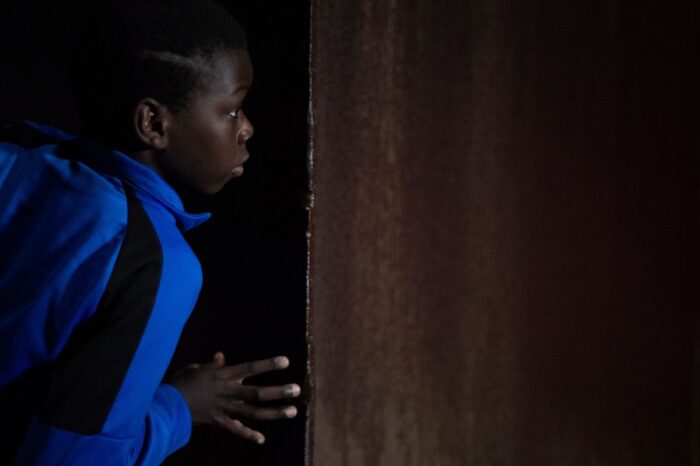Tori and Lokita, the 75th Anniversary Prize-winning film at Cannes last year debuting in North America this week, is both a story for our age and no-frills filmmaking at its finest. With political unrest and continual diaspora ongoing issues facing people and countries across the globe, tales of immigrants told with tact and sensitivity help convey an understanding of their expressly human plight. The two protagonists named Tori and Lokita, not long ago having migrated to Belgium, are young, dispossessed, and at risk, but they are not without guile and determination. Their tale, told with exacting, unadorned precision by the Dardenne brothers Jean-Pierre and Luc, makes for a pulse-pounding thriller and a stunningly poignant drama of human connection.
Lokita (Joely Mbundu) is a 17-year-old from Benin. Tori (Pablo Schils) is 12, from Cameroon. Dependent upon each other for support and survival, together they carry out a necessary pretense that they are brother and sister. Their situation is dire: they earn a few euros for singing in a grimy trattoria, where the real money flows from the drugs dealt on the side by the abusive cook Betim (Alban Ukaj), who uses the two children as runners for his deals. When their singing shift is done, Betim sends them through the city streets to sell his illegal wares and bring back his cash. The two use their miniscule cut to send money back to their families.

But the immigration officials are suspicious of their activity, and of their story. Lokita’s fake, coached memories of their time together in an orphanage don’t hold up. Meanwhile, the human traffickers who brought them across the border are keeping a close eye on their activity, too. Things get worse when Tori and Lokita are separated: Lokita is made a prisoner of the drug-running gang, working in their marijuana hothouse, where she lives on a dirty cot in dangerous conditions, and poor Tori is left without any knowledge of her whereabouts.
Despite her imprisonment, Lokita does not give up hope, and Tori, a little boy with a huge heart, does not give up faith. Even though he’s in a foreign city, surveilled by the authorities and drug bosses both, he’s still determined to find his friend, even though he has nearly no resources with which to do so. A thousand things could go wrong: Lokita could die in a hothouse fire, she could be the victim of sexual or physical abuse, she could be killed at any moment by any member of the gang, and so could for that matter Tori, who embarks on a perilous journey to find—and, he hopes, to save—the girl he’s come to know as his own sister.

It is, as the saying goes, a beautiful friendship, and the loving, sibling-like relationship between young Tori and only slightly-less-young Lokita is the very heart of the film. The two—both played by nonprofessional actors with no prior experience—are intelligent, unique, caring human beings who hope only to survive, to earn some modest pay for work, and, someday, to rejoin their own now-abandoned families on the other side of the borders they crossed. Mbundu and Schils excel at conveying a deep care for each other both in the film’s lighter moments and its more traumatic ones. Exiled and exploited, to nearly everyone else they are little but modern-day slaves, kept only as long as they willingly obey orders.
It’s hard not to watch their predicament without a sense of dread. Of those thousand things that can go wrong, surely at least a few will, and do. Tori’s attempted rescue of Lokita from her hothouse prison is one that will have you both questioning the boy’s judgment and admiring his bravery. The rescue and chase scenes may set your pulse pounding, but they should also set your blood boiling at the injustices of societies that will consign loving, intelligent human beings like Tori and Lokita to slavery.
The Dardennes—who’ve been working in this idiom for more than two decades since their debut The Promise, through two Palme d’Ors (for Rosetta and The Child) and an Academy Award nomination (for Marion Cotillard’s performance in Two Days, One Night)—let the story unfold almost without artifice. The first shot—a medium close-up of Lokita being interrogated by an immigration officer unconvinced by her story—is a long take lasting over two minutes, and another five or six go by before the Dardennes use anything other but the same medium-close perspective. There’s no nondiegetic music, no rapid editing, no layers of metatextuality or narrative complexity. Nothing, really, except the very human story of two children trapped in a system that cannot do them justice.
All across the world, filmmakers continue to dare to tell the inconvenient truths of border crossings with fictional stories like these. In Palestine, 200 Meters. In Mexico, Sansón and Me. In Iran, No Bears. In Venezuela, The Box. All are excellent, finely-detailed studies of the conflicts that entrap and exploit the dispossessed. With Tori and Lokita, The Dardennes know exactly how to focus a story of trafficking and exploitation on the human dignity of those who are most jeopardized by a society that can’t come to see the sanctity, the dignity, of the lives of immigrants.
Directed and written by Jean-Pierre Dardenne and Luc Dardenne and starring Pablo Schils and Joely Mbundu, Tori and Lokita debuts in North America Friday, April 7, at the Music Box Theater in Chicago, with additional openings to follow. Distributed by Sideshow and Janus Films. Belgium, France | 2022 | 88 minutes | In French, with English subtitles.



